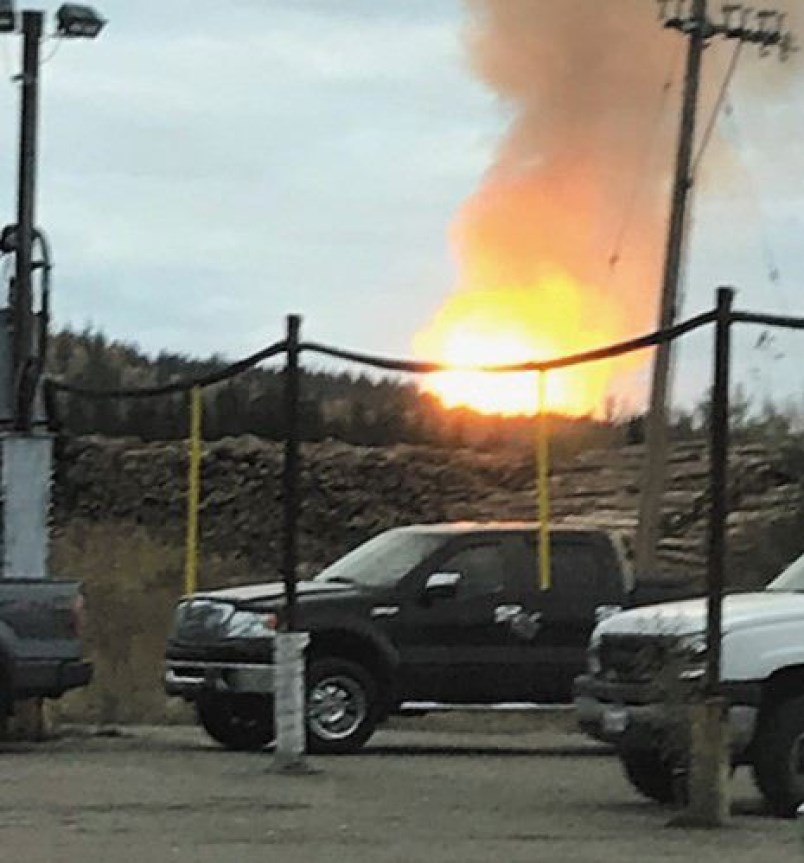Enbridge is fighting back against legal action brought by the Lheidli T'enneh First Nation over the natural gas pipeline explosion last fall.
In a response filed this week in B.C. Supreme Court in Prince George, the company maintains the LTFN's entire lawsuit lacks merit and that the company has met or exceeded the standard of care for the pipeline.
The company also says that notwithstanding Enbridge's prior instructions that members living south of the Fraser River remain in their homes in event of a leak, the Lheidli T'enneh self-evacuated without instruction to do so from the RCMP or the company.
Only after the evacuation did the RCMP and Enbridge agree that, for consistency, other homes within two kilometres of the rupture should also be evacuated, the company says in the response.
On Oct. 9, 2018, the system's 36-inch pipeline ruptured, shooting a massive fireball into the air. The company says the location is about 700 metres from the reserve's northern boundary while the Lheidli T'enneh says the distance is 500 metres.
In February, then-Chief Dominic Frederick filed a notice of civil claim on behalf of the LTFN against Enbridge, saying in part that the explosion and its aftermath have "caused serious and constant distress and anguish within the Lheidli T'enneh community."
The band is seeking an injunction ordering Enbridge to dismantle and remove the pipeline from LTFN territory. The band is also seeking damages.
Enbridge's so-called T-South system consists of two lines, one 36 inches and one 30 inches. It runs from Fort Nelson to Huntingdon-Sumas in Washington State, and supplies 60 per cent of the natural gas consumed in B.C.'s Lower Mainland.
About 139 kilometres of the pipeline traverses LTFN territory and 1.5 kilometres runs through the southwestern corner of the LTFN's Fort George No. 2 Indian Reserve.
The LTFN also claims the pipeline trespasses on its territory, saying Enbridge never adequately consulted the band over its construction and failed to consult with the band prior to bringing it back into operation.
In reply, company says in part that in 1955, the LTFN, then known at the Fort George Band, agreed to allow Westcoast Transmission, which has since become a wholly-owned subsidiary of Enbridge, to use lands on the reserve for the pipeline in return for agreed compensation.
"The agreed compensation includes payments for damages suffered by individual Lheidli T'enneh members as a result of the pipeline," Enbridge says.
LTFN is not entitled to damages, Enbridge maintains, saying it has not suffered any loss, damage or expense and, if there were any, the band is not entitled based on the doctrine of remoteness and forseeability and a failure to mitigate.
Among other things, the LTFN unreasonably failed to follow the company's instructions to stay in their homes in the event of an incident and the company has provided accommodation and support to the band, "both financially and through the delivery of service programs."
Enbridge also denies LTFN is entitled to injunctive relief, saying the pipeline has operated safely for over 60 years and following the explosion, service was restored on a careful and incremental basis.
"There is no irreparable harm to Lheidli T'enneh," Enbridge says.
None of the allegations have yet been tested in court.
Both the LFTN notice of claim and Enbridge's response are posted with this story at princegeorgecitizen.com.



